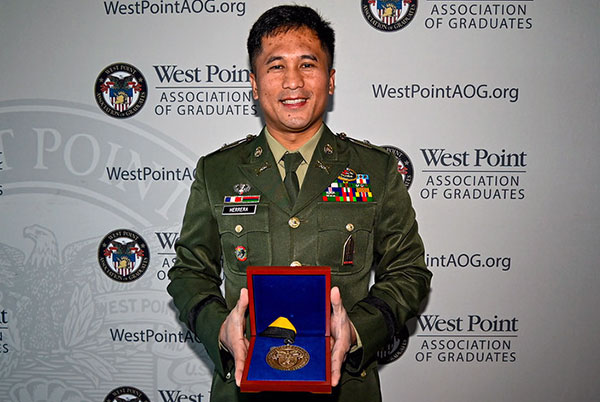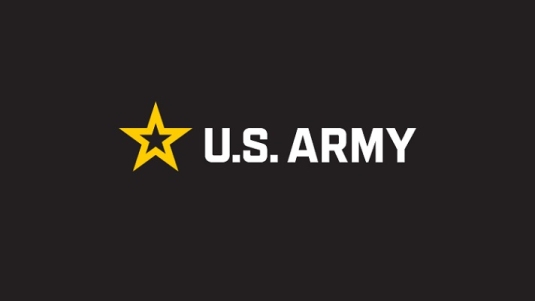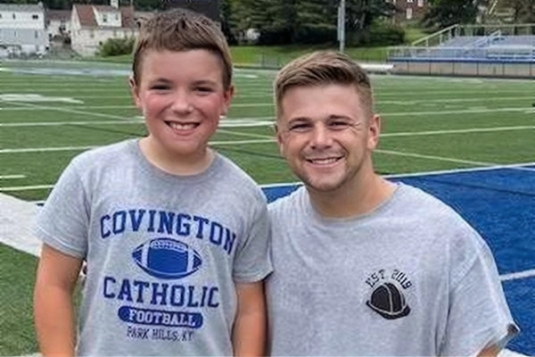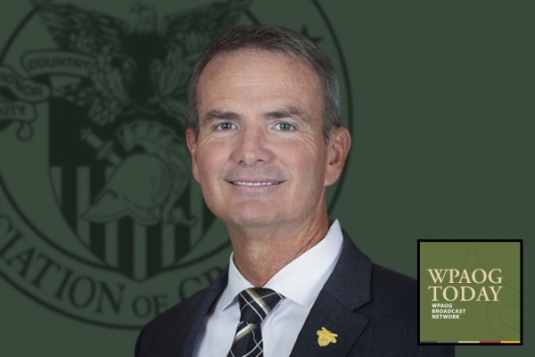Making a Difference
On October 10, the West Point Association of Graduates (WPAOG) presented the 2024 Alexander R. Nininger Award for Valor at Arms to MAJ Floren Herrera ’13 of the Philippine Army.
As LTG Steve Gilland ’90, the 61st Superintendent of West Point, noted in his introductory remarks to the Corps of Cadets assembled in the Mess Hall for the presentation ceremony, MAJ Herrera “is the first Nininger Award recipient from an allied nation’s armed forces, and he served in the same Scout regiment as LT Nininger.”
From June 12 to October 16, 2017, while serving as the executive officer of 2nd Scout Ranger Company, 1st Scout Ranger Battalion, Philippine Army, then-1LT Herrera displayed remarkable bravery and leadership during the Battle of Marawi against 1,000 foreign militants and local terrorists affiliated with the Islamic State. Herrera daringly maneuvered his platoon around a 50-meter open area and tactically seized a building, paving the way for a successful ambush against unsuspecting enemy forces. His actions resulted in a significant number of enemy casualties and saved the lives of troops who were in the enemy’s kill zone. Furthermore, during the clearing of several buildings occupied by enemy snipers, Herrera displayed exceptional bravery and tactical expertise by maneuvering his platoon through unexpected avenues of approach and catching the enemy by surprise, neutralizing two key terrorist leaders when he spearheaded the assault in the buildings adjacent to their occupied structure.
“MAJ Herrera is a most worthy representative of all West Point graduates who have bravely led soldiers in battle,” said COL (R) Mark Bieger ’91, WPAOG President and CEO, before presenting Herrera with the 2024 Nininger Award.
“When I left West Point, my leadership goal was to make a difference,” Herrera told the Corps of Cadets in his acceptance speech. Regarding what he called his “philosophy of making a difference,” Herrara provided cadets with two key points: leading from the front and empowering your team. “Leading by example requires becoming a selfless leader, a leader of character,” he said. “Strive to establish a culture that ensures that even if a less capable leader follows after your stint, a strong foundation remains, allowing the unit to thrive.” When it came to his second key point, Herrera said, “Begin empowering your units by ensuring everyone’s values align with the Army values, that everyone takes ownership, that subordinate leaders are engaged and capable, and that everyone is held accountable to the highest standards.” In summarizing his points, Herrara told cadets, “Everything I shared today, I started learning right here at West Point.”
Speech
LTG Steven Gilland (Superintendent)
HIS EXCELLENCY ANTONIO M. LAGDAMEO
MR. SENEN T. MANGALILE
Consul General Sonny Busa
Honorable Bob McDonald (Chairman of the Board, AOG)
Distinguished Guests
Cadets, Ladies and Gentlemen, good evening.
I want to thank God, Almighty, for the opportunity to be here tonight to receive the award in honor of the memories of my fallen comrades and heroes of Marawi.
I want to thank my parents, who are now my messengers to God in Heaven.
I also want to thank my wife, Jayaysa, and my two children, Derrick and Mikhael for all their understanding and support to my service.
My siblings, Manang Vilma, Manang Reme, and Junior, Families, mentors, friends, the Association of Graduates, the United States Military Academy, thank you.
Shortly after graduating from West Point as part of the Class of 2013, I was asked how I would define success in my military service. My answer was simple: success would not be determined by the rank I achieve or the awards I receive. Instead, it would be defined by the difference I make—in the units I lead and in the lives of my soldiers.
When I left West Point, my leadership goal was clear: to make a difference. This goal gave me a deep sense of purpose as I navigated the early challenges of my service as a new lieutenant.
Tonight, I want to share lessons relevant to all cadets, no matter where your future roles take you. Whether you lead in combat, in garrison, or in any other capacity, the philosophy of making a difference remains relevant.
Throughout my service, I lost comrades and close friends who, like Alexander Nininger, made the ultimate sacrifice. Nininger’s bravery in Bataan—charging forward despite his wounds—mirrors the courage I saw in my comrades. Their selflessness inspired me to serve with deeper commitment. Each loss transformed my goal of making a difference into a commitment to make that difference enduring and sustainable.
Making a sustainable difference means creating a solid foundation of service excellence that becomes ingrained in the unit’s culture and values. This ensures that the unit continues to thrive long after a leader’s tenure. It involves developing a unit that upholds high standards of excellence even under poor leadership and can reach even greater heights with a capable leader.
To make a sustainable difference, I want to share two crucial points: leading from the front and empowering your team.
In the battles against an overwhelming number of terrorists determined to kill me and my soldiers in Sulu, Piagapo, Basilan, and Marawi explosions and casualties caused, at times, even the most solid plans to collapse. But one thing remained constant: look to the leaders and follow them.
When initiating progressive changes in a unit filled with seasoned warriors, I learned from leading Philippine Scout Rangers that you must first earn the respect of your troops. You do this by leading them from the front in assaulting through enemy defenses.
Going far from the battlefield, on the grounds of the Philippine Military Academy and the Scout Ranger School, guided by a program designed to develop warriors and leaders, leading from the front remained central—both as the core principle we instilled in our students and as the method through which we imbibed it into their mindset.
For those who may not lead soldiers in combat, leading by example also means striving to be a beacon of excellence, embodying every positive change you wish to implement. But you will not always be one of the strongest soldiers. Your troops will see you tire. Don’t let that affect your goal to always be a leader by example. You can turn that weakness into an empathy-filled connection with your troops and still lead by example. Get tired, but by all means, keep pushing forward because that will inspire your soldiers to also overcome their weaknesses and follow your lead.
Additionally, when reporting to your unit, you may not always be fully proficient in its technical functions. However, through hard work, humility, and discipline, you will seize the opportunity to learn from both your superior officers and subordinates. Before long, your commitment to leading by example will place you at the forefront of your troops, guiding them in mastering the technical aspects that drive organizational improvement.
Leading by example requires becoming a selfless leader. As a leader of character, strive to establish a culture that ensures that even if a less capable leader follows after your stint, a strong foundation remains, allowing the unit to thrive.
This only happens if you do not seek change solely to build a legacy based on selfish personal recognition. Positive changes are never the leader’s work alone; they are a collective effort of the unit. Focusing on personal legacies often leads to unproductive competition among leaders, who may prioritize personal recognition over the unit’s success. Consequently, no sustainable change occurs, and opportunities for progress are lost.
Importantly, the collective approach to effecting lasting transformations requires empowerment.
True empowerment happens when your team, whose values align with the Army values, takes full ownership of their roles and understands that their contributions are vital to the organization’s success. Equip them with the tools and confidence to improve continually, and you will build a team capable of sustained excellence.
However, inspiring ownership is not easy. It requires the active involvement of subordinate leaders, officers, and NCOs. Mentor them to become even better leaders than you.
As every member of your unit understands their role, accountability becomes essential. It serves as a feedback mechanism for individual and unit growth. However, ensure that wrongdoings beyond correctional growth are addressed to signal that gross disrespect for standards will not be tolerated. This will ensure continued discipline and focus on the unit’s progress.
But to sustain progress amid failures, accountability alone is not sufficient. Your troops should share a commitment to step up and fill in gaps.
Let me say this again. Cadets, ladies, and gentlemen, to make a sustainable difference in your future units, be leaders of character who exemplify the progress you want to see. Begin empowering your units by ensuring everyone’s values align with the Army values, that everyone takes ownership, that subordinate leaders are engaged and capable, and that everyone is held accountable to the highest standards. More importantly, inspire them to step up amid shortcomings and continue driving progress long after your leadership ends.
However, achieving enduring progress is not an easy feat. You will face resistance to the changes you initiate. You will be compelled to make unpopular decisions. But I am confident that you will uphold the West Point principle of doing the harder right over the easier wrong—all for making progressive organizational changes.
I am confident that you have the ability to lead from the front and become catalysts for lasting change because everything I shared today, I started learning right here at West Point. The only thing separating you from each other is the grit to apply the leadership lessons you learn here amid varying challenges.
This difference stems from your commitment and discipline under the West Point leader development program, which encompasses Character, Academics, Military, and Physical excellence.
Before I end, let me quote our national hero in the Philippines, Dr. José Rizal. Like Alexander Nininger, Rizal embodied the ideals of sacrifice and belief in a better future.
In his book El Filibusterismo, he wrote, “I will die without seeing the dawn break over my country. But I am certain it will rise, and the Filipino people will see their freedom.” Rizal’s sacrifices became a source of inspiration for Filipino heroes who fought for the nation’s freedom and made a long-lasting impact on future generations.
As we reflect on the ideals exemplified by Rizal, Nininger, and the countless heroes who selflessly offered their lives for our freedom, please allow me to tribute this award in memory of my comrades from the 2nd Scout Ranger Company, First Scout Ranger Battalion, Fist Scout Ranger Regiment. Their courage and dedication continue to inspire me every day.
- 2LT Ronald Detalla, my fellow platoon leader, who fell in 2015 while fighting Abu Sayyaf in Sulu.
- Sgt. Jungie Dizon, who made the ultimate sacrifice in 2021, defending the people of Cotabato.
I also want to honor the following fallen heroes of Marawi, individuals I had the privilege of knowing as friends:
- 1LT John Carl Morales
- 1LT Franklin Abacajen
- 1LT Junrich Legada
- 2LT McGlen Abuyabor
- Pfc Jaime Invento
- Pfc Jetrho Vincent Carlos
May we also remember CPT Rommel Sandoval, Pfc Ceferino Tugade Jr., and more than a hundred other Scout Rangers, soldiers, and police officers who sacrificed their lives in that battle.
Just as Dr. José Rizal and Alexander Nininger expressed their unwavering faith in the future, we must ensure the sacrifices of those who gave their lives are not wasted.
Therefore, amid the rapidly evolving security landscape that continues to pose challenges to our nations, we must remain steadfast as instruments of change, advancing all they fought for—for Duty, for Honor, and for Country!
THANK YOU
Photos
Announcement
September 25, 2024
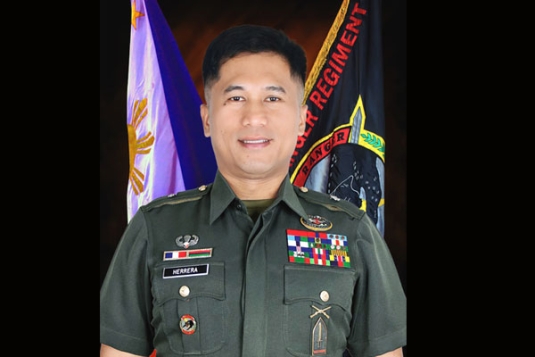
The West Point Association of Graduates is pleased to announce that Maj. Floren Herrera, Class of 2013, has been selected to receive the 2024 Alexander R. Nininger Award for Valor at Arms, which will be presented at West Point, New York on October 10, 2024.
Then-1st Lt. Herrera displayed remarkable bravery from June 12 to October 16, 2017, as the executive officer of 2nd Scout Ranger Company, 1st Scout Ranger Battalion, Philippine Army, and leadership during the Battle of Marawi against 1,000 foreign militants and local terrorists affiliated with the Islamic State. Herrera daringly maneuvered his platoon around a 50-meter open area and tactically seized a building, paving the way for a successful ambush against unsuspecting enemy forces. His actions resulted in a significant number of enemy casualties and saved the lives of troops who were in the enemy’s kill zone. Furthermore, during the clearing of several buildings occupied by enemy snipers, Herrera displayed exceptional bravery and tactical expertise by maneuvering his platoon through unexpected avenues of approach and catching the enemy by surprise. Herrera was also instrumental in the neutralization of two key terrorist leaders when he spearheaded the assault in the buildings adjacent to their occupied structure. All these achievements are a testament to Herrera’s courage, tactical expertise, and dedication to the safety of his troops.
For his actions, Maj. Herrera was awarded the Distinguished Conduct Star, the Philippines’ second highest award for heroism (equivalent to the Distinguished Service Cross), on February 20, 2020. He has served with distinction in keeping with the finest traditions of Filipino soldiery. Herrera was also awarded three Gold Cross Medals, the Philippines’ third highest award for heroism (equivalent to the Silver Star Medal): the first for leading his platoon in an intense and close encounter against a numerically superior enemy of Abu Sayyaf Group members on December 30, 2015; the second for leading a mission to engage and defeat a group of 150 foreign and local terrorists in Barangay Gacap, Piagapo, Lanao del Sur, from April 22-24, 2017; and the third for leading a team to rescue hostages held by foreign and local terrorists on October 19, 2017. On September 8, 2017, Herrera was awarded the Wounded Personnel Medal (equivalent to a U.S. Purple Heart) for wounds sustained as a member of the First Scout Ranger Regiment, SOCOM, Philippine Army during an encounter against Maute Terrorist Group in Marawi City.
Maj. Floren Herrera has had several assignments and positions in different units and offices within the Philippines Military Academy (PMA) and the Philippine Army, including Scout Ranger platoon leader, Scout Ranger executive officer, Scout Ranger company commander, assistant company tactical officer, chief public relations officer, administrative and operations officer, battalion S-3 and S-7, readiness officer, curriculum and faculty development officer, chief of the training department, and other administrative positions. Herrera served in the same Scout Ranger Regiment as 2nd Lt. Alexander R. Nininger ’41. This Scout Ranger regiment is known for its elite and specialized training and is an elite unit of the Armed Forces of the Philippines, specializing in reconnaissance and unconventional warfare. Serving in this regiment requires a high level of physical fitness, endurance, and mental fortitude.
Maj. Herrera’s heroism and valor are in keeping with the finest traditions of military service and reflect worthy recognition upon him, the United States Military Academy, and the Philippine Army.

